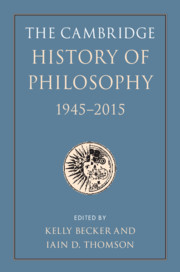Book contents
- The Cambridge History of Philosophy, 1945–2015
- The Cambridge History of Philosophy, 1945–2015
- Copyright page
- Contents
- Contributors
- Preface and Acknowledgments
- Introduction
- Part I Analytic Philosophy
- Part II Continental Philosophy
- Part III Bridge Builders, Border Crossers, Synthesizers, and Comparative Philosophy
- Section Eight Bridge Builders, Border Crossers, Synthesizers
- 42 Rethinking the Analytic/Continental Divide
- 43 Phenomenology and Ordinary Language Philosophy
- 44 Phenomenology Meets Philosophy of Mind and Language
- 45 The Impact of Pragmatism
- 46 Unruly Readers, Unruly Words
- 47 Anglo-American Existential Phenomenology
- 48 A Conceptual Genealogy of the Pittsburgh School
- Section Nine Comparative Philosophy
- Part IV Epilogue: On the Philosophy of the History of Philosophy
- References
- Index
43 - Phenomenology and Ordinary Language Philosophy
from Section Eight - Bridge Builders, Border Crossers, Synthesizers
Published online by Cambridge University Press: 08 November 2019
- The Cambridge History of Philosophy, 1945–2015
- The Cambridge History of Philosophy, 1945–2015
- Copyright page
- Contents
- Contributors
- Preface and Acknowledgments
- Introduction
- Part I Analytic Philosophy
- Part II Continental Philosophy
- Part III Bridge Builders, Border Crossers, Synthesizers, and Comparative Philosophy
- Section Eight Bridge Builders, Border Crossers, Synthesizers
- 42 Rethinking the Analytic/Continental Divide
- 43 Phenomenology and Ordinary Language Philosophy
- 44 Phenomenology Meets Philosophy of Mind and Language
- 45 The Impact of Pragmatism
- 46 Unruly Readers, Unruly Words
- 47 Anglo-American Existential Phenomenology
- 48 A Conceptual Genealogy of the Pittsburgh School
- Section Nine Comparative Philosophy
- Part IV Epilogue: On the Philosophy of the History of Philosophy
- References
- Index
Summary
By the second half of the twentieth century, Heidegger’s philosophical project (originating in and reacting against his early phenomenological masterpiece Being and Time) had long established him as part of the living present of Continental European intellectual life, and Wittgenstein’s later philosophical investigations (importantly hinging on a critique of his massively influential early work, the Tractatus Logico-Philosophicus) had become sufficiently well known to conjoin with the work of J. L. Austin to form an increasingly dominant movement in the Anglophone philosophical world known as “ordinary language philosophy.”1 On the face of it, however, these two towering figures and the philosophical schools they inspired not only differ significantly from each other; they each embody everything against which the other sets its face.
- Type
- Chapter
- Information
- The Cambridge History of Philosophy, 1945–2015 , pp. 590 - 602Publisher: Cambridge University PressPrint publication year: 2019

